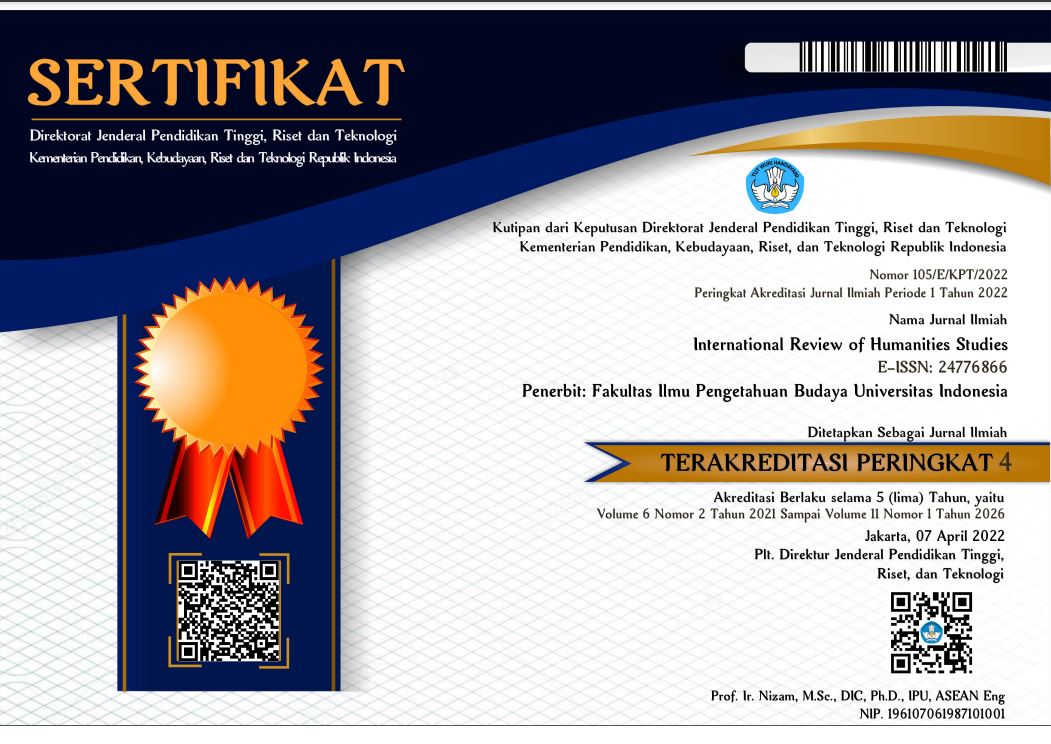International Review of Humanities Studies

Abstract
In 2022, based on Google Trends tools, Indonesia is ranked third as the country with the most searches related to Japanese anime. Wibu is a term that refers to someone who is outside Japan but likes and even tends to be obsessed with the culture of that country. This research aims explore how stereotypes of Wibu in Indonesia are constructed by digital media, specifically YouTube. Research findings show that Wibu in Indonesia is stereotyped as "smelling of onions", "Wibu Nolep", "perverted Wibu" and “pshycopath Wibu.” By conducting textual analysis on YouTube videos that are related to Wibu content, we argue that the construction of Indonesian Wibu’s stereotypes are done through narrative and visual elements in the videos. Based on this research, researchers discovered the role of YouTube in affirming the stereotypical construction of Wibu in Indonesia with ambiguous representations.
References
Afiuddin, M. C. (2019). Fenomena Gaya Hidup Remaja Wibu Pada Budaya Populer Jepang Melalui Anime Dan Fashion. Jakarta: Universitas Satya Negara.
Agustina, Helmi. (2015), Konsep Diri Otaku Anime di Kota Serang, Skripsi. Banten: Universitas Sultan Ageng Tirtayasha.
Chao, T. Y. (2020). An Introduction to the First Taiwanese BL Musical, The New Member. Mechademia, 13(1), 137-142.
Dervin, F. (2012). Cultural identity, representation and othering. The Routledge handbook of language and intercultural communication, 2, 181-194.
Esposito, M. (2021, September 12). What’s a Dakimakura? https://www.goodnights.rest/japanese-body-pillow-dakimakura/
Gardiner, R. E. A. (2019). 'Weeaboo Japanese': exploring English-Japanese language- mixing in online Japanese popular culture fandom: a thesis presented in partial fulfilment of the requirements for the degree of Master in Philosophy in Linguistics at Massey University, Alban, NewZealand (Doctoral dissertation, Massey University). Lacuesta, J. The Weeaboo Subculture: Identification and Performance: San Francisco State University
McGee, J. (2012). Discipline and Post: Foucault and “Weeaboo Horror Stories” on the Internet (Doctoral dissertation, Aichi Shukutoku University).
Permana, Muhamad. 2018. Pengalaman Komunikasi dan Kontruksi Makna Otaku bagi Penggemar Budaya Jepang. Skripsi. Bandung: Universitas Padjadjaran Publisher.
Sukmana, S. H., Hidayat, M. K., & Satriadi, I. (2015). Pengaruh Kualitas Anime terhadap Kepuasan Penonton. Jurnal Sistem Informasi, 4(1), 73-80.
Wicaksono, R. Stigma Sosial Terhadap Wibu (Studi Kasus Wibu di Kota Depok, Jawa Barat) (Bachelor's thesis, Program Studi Sosiologi Fakultas Ilmu Sosial Dan Ilmu Politik Universitas Islam Negeri Syarif Hidayatullah Jakarta).
Winge, T. M. (2018). Costuming cosplay: dressing the imagination. Bloomsbury Publishing.
Wardhana, O. W. (2023). Subculture Career as an Alternative to Japanophilia or Weeaboo (WIBU) Yogyakarta Otsuru Community. Commsphere: Jurnal Mahasiswa Ilmu Komunikasi, 1(I), 34-40.
Wittenfelt, M. (2020). Practically Naked: Fan Service in Anime as Hyper-Gendered Performances of Spectacle
Recommended Citation
Junianto, Iqbal Eka and Tambunan, Shuri Mariasih Gietty
(2024)
"AFFIRMING WIBU’S STEREOTYPES THROUGH YOUTUBE VIDEOS,"
International Review of Humanities Studies: Vol. 9:
No.
1, Article 12.
DOI: 10.7454/irhs.v9i1.1279
Available at:
https://scholarhub.ui.ac.id/irhs/vol9/iss1/12
Included in
Anthropology Commons, Art and Design Commons, Creative Writing Commons, Cultural Heritage Law Commons, Education Law Commons, Film and Media Studies Commons, History Commons, Intellectual Property Law Commons, International and Area Studies Commons, Legal Writing and Research Commons, Linguistics Commons, Museum Studies Commons, Philosophy Commons, Urban Studies and Planning Commons


